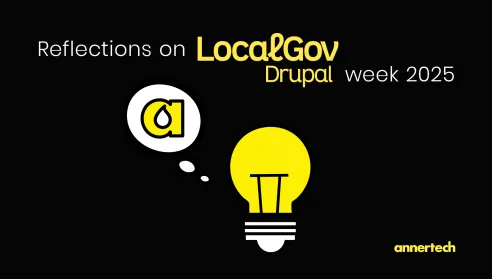Drupal is the most popular CMS for councils. This is why

It's a time-saving, cost-effective CMS that ‘meets their specific needs’. These are some of the reasons why Drupal has become so attractive to councils.
Drupal has unseated Jadu to take up the mantle of most popular content management system (CMS) among councils in Ireland and the UK. This is according to the latest updates to the LocalGov CMS Directory, which lists the content management systems that councils currently use. The directory is maintained and updated by Digital Health Check.
The latest Directory update reveals that, out of 410 councils in Ireland and the UK, the most popular CMS is Drupal, with 87 of the councils using Drupal for their websites.
This is followed by Jadu (69) and Umbraco (59). GOSS iCM (38), WordPress (27) and Contensis CMS (24) round up the CMSs that hit double figures. The remaining 37 CMSs range from well known ones like Joomla and SharePoint, to relatively obscure ones.

In March 2024, Drupal was the most popular CMS for councils in Ireland and the UK, according to Digital Health Check's LocalGov CMS Directory.
How has this changed over the years?
In November 2021, a review carried out by UK-based digital consultant Dave Briggs, revealed that Jadu was the most popular CMS for UK councils (Irish councils weren’t included in this review).
In 2021, 70 of the UK councils polled used Jadu for their websites. Drupal was used by 65 councils, followed closely by Umbraco.
Most popular CMSs for councils in 2021
- Jadu (70)
- Drupal (65)
- Umbraco (63)
- GOSS iCM (43)
- Contensis (25)
- Wordpress (19)
“The top five CMSs have changed a little, the main riser being Drupal, due to growing take-up by councils of LocalGov Drupal. There are currently more than 40 live LocalGov Drupal sites, with more in development,” said Digital Health Check’s Colin Stenning, who had assisted with the research in 2021.
Why are councils turning to Drupal?
Weighing up which CMS to choose is one of the most important decisions an organisation can make. For councils, there is a need to go with a CMS that works, that has the features that councils need and, crucially, one that is secure.
Choosing the wrong CMS can set you back in terms of time, money, and frustration – and it’s a decision that you’ll be stuck with for years, usually, especially if you’re locked in to a specific vendor. LocalGov Drupal is a CMS that is built on Drupal, so the code is freely available, which means no vendor lock-in. But, most importantly, it has been created by councils for councils, who share code, user research and ideas.
Its numerous benefits include:
- Reducing time and resource-intensive tasks of redesigning and rebuilding platforms. Instead, councils use a platform that other councils have already built to meet business objectives.
- Sharing knowledge and practices with other councils that have already solved many common problems through LocalGov Drupal.
- Accessibility – LocalGov Drupal is WCAG 2.1 AA compliant out of the box.
- Cost-effectiveness – councils save up to 80%. In addition, because it is built using the open-source CMS, Drupal, there are no licence fees involved.
Annertech’s Director of Development Mark Conroy has been involved with LocalGov Drupal from the beginning.
“LocalGov Drupal has enterprise-ready features, a robust theming system, and no licence fee. It is proving itself to be the most cost-effective way to develop council websites. Backed by a slogan of ‘by councils for councils’, there is no other CMS or project like it on the market.” – Mark Conroy
Colin agrees, saying that “LocalGov Drupal appeals to councils because it has been developed by councils for councils, so specifically meets their needs”.
“It is also perhaps due to the potential cost savings and to the growing functionality,” he said.
This functionality is constantly improving as more councils join the LocalGov Drupal family, and use budgets that they would have used on development or licences on new features and improvements. The LocalGov Drupal project also aligns with the Irish government’s Build to Share initiative, which forms part of the Irish government’s “Better Public Services, the Public Service Transformation 2030 Strategy".
Its goal is for the public sector to share code in order to save valuable resources like time and money.
“The other thing that stood out from this new research is that the number of CMSes being used by councils is reducing as more councils are moving to the more popular CMSs (Drupal, Jadu, Umbraco, GOSS iCM and WordPress),” said Colin.
The more popular the CMS the more features and support they tend to offer.
Conclusion
The notion of building to share is shaking up the way the public sector approaches its ICT strategy and procurement. Both are concerned with delivering exemplary services to citizens while coalescing technical resources to save time and money.
The choice of which CMS to choose is one that will affect an organisation for years to come. Researching all the options available is time-consuming but it’s worth it to have a CMS that suits your organisation’s needs and budget.

Thinking of moving your website to Drupal?
Annertech is well-known for being a leading Drupal agency, and we have been involved with the LocalGov Drupal project since the beginning.



